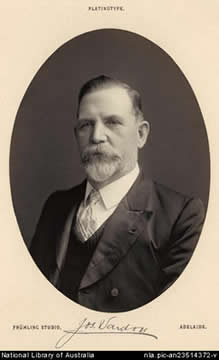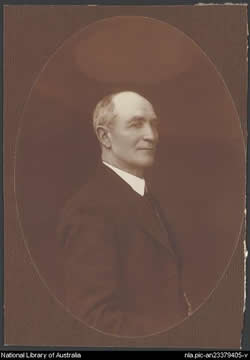207 Petitions disputing elections
-
Any question concerning the election, choice or appointment of a senator which cannot, under the provisions of the Commonwealth Electoral Act, be brought before the Court of Disputed Returns, may be brought before the Senate by petition.
-
A petition shall be lodged with the Clerk within 40 days after the certificate of the Governor of the state for which the senator has been elected, chosen or appointed has been laid on the table.
-
The sum of $100 shall be paid to the Clerk at the time the petition is lodged as surety for the payment of costs by the petitioners in case the Senate decides that the petitioners shall pay costs to the respondent.
-
If these conditions have been complied with, the Clerk shall so certify on the petition, and the President shall lay the petition on the table.
Amendment history
Adopted: 19 August 1903 as SOs 316 to 319 (corresponding to paragraphs (1) to (4)) but renumbered as SOs 312 to 315 for the first printed edition
1989 revision: Old SOs 324 to 327 combined, structured as four paragraphs and renumbered as SO 207; deletion of reference to Committee of Disputed Returns and Qualifications; expression clarified and streamlined, and terminology modernised (including numerals substituted for words)
Commentary
Determination of questions relating to its composition is one of the traditional privileges of a House of Parliament but the Australian Constitution also provides for such matters to be dealt with by statute. Section 47 of the Constitution provides:
Until the Parliament otherwise provides, any question respecting the qualification of a senator or of a member of the House of Representatives, or respecting a vacancy in either House of the Parliament, and any question of a disputed election to either House, shall be determined by the House in which the question arises.
For much of its existence, the Senate has had little recourse to these standing orders because of the enactment of legislation to deal with such matters.
From the 1903 debates we know that these standing orders were modelled on the provisions of the state electoral laws but for Senator Pearce (ALP, WA) they begged the question, what happens next after a petition has been tabled? Consequently, paragraph (4) was amended before adoption to provide for a petition, duly lodged with the Clerk together with the accompanying surety, to be referred to the Committee of Disputed Returns and Qualifications. That committee, which had been established by original SO 38, debated on 10 June 1903, was responsible for inquiring into and reporting on the qualifications of senators chosen or appointed. It had been intended that the committee have power to inquire into and report on questions of disputed elections generally but this had been revised following the enactment of legislation in 1902 setting up a Court of Disputed Returns for that purpose. The committee would deal with matters that did not come within the electoral law.[1]

Senator Joseph Vardon (Anti-Socialist, SA) (Source: National Library of Australia)

Senator James O'Loghlin (APL, SA) (Source: National Library of Australia)
In fact, the Senate referred only one petition to the committee, that of Joseph Vardon against the choice of Senator O’Loghlin (ALP, SA) by the South Australian Parliament in 1907 and, again, the question arose, what happens next? Encountering a difficult point of constitutional law which it could not settle, the Senate, on the committee’s recommendation, requested the government to introduce legislation to provide for petitions to be transmitted to the Court of Disputed Returns.[2] The result was the Disputed Elections and Qualifications Act 1907 which also clarified the application of the provisions to the choice of senators to fill casual vacancies, a key issue in the Vardon and O’Loghlin case.[3] Furthermore, the Act provided for any question relating to the qualification of a senator or member, or respecting a vacancy in either House, to be referred by resolution of the relevant House to the Court of Disputed Returns which then had jurisdiction to hear and determine the question. These provisions are now in the Commonwealth Electoral Act 1918. A resolution to refer a question to the Court of Disputed Returns is distinct from the petitioning process provided for by this standing order, which applies only to matters outside the jurisdiction of the Court of Disputed Returns.[4]
A Committee of Disputed Returns and Qualifications continued to be appointed at the commencement of each Parliament until it was abolished by sessional order after the 1987 double dissolution, as part of an attempt to create parallel committee systems in both Houses.[5] The sessional order provided for the deletion of old SO 38 and for consequential amendments to other standing orders including the precursor to paragraph (4) from which the reference to the committee, inserted by amendment at the time of adoption in 1903, was deleted. These changes were not opposed.[6] The sessional order was incorporated into the standing orders as part of the 1989 revision.
The reference to a sum of money in paragraph (3) appears to have been changed by clerical amendment rather than by a deliberate decision of the Senate. It appears as “$100” for the first time in the 1966 edition of the standing orders, only slightly anticipating the introduction of decimal currency on 14 February that year. It replaced a reference to “₤50” in previous editions, a sum which had never been altered to take account of inflation. The surety appears to have been paid only once, in the Vardon and O’Loghlin case. Departmental correspondence shows that Vardon paid ₤50 when lodging his petition against O’Loghlin and that his deposit was returned to him pursuant to a resolution of the Senate before the petition was transmitted to the Court of Disputed Returns.[7]
See Odgers’ Australian Senate Practice, 12th edition, pp.130–32 for current mechanisms for the determination of questions of qualifications.